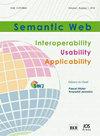Semantic Web technologies and bias in artificial intelligence: A systematic literature review
IF 3
3区 计算机科学
Q2 COMPUTER SCIENCE, ARTIFICIAL INTELLIGENCE
引用次数: 0
Abstract
Bias in Artificial Intelligence (AI) is a critical and timely issue due to its sociological, economic and legal impact, as decisions made by biased algorithms could lead to unfair treatment of specific individuals or groups. Multiple surveys have emerged to provide a multidisciplinary view of bias or to review bias in specific areas such as social sciences, business research, criminal justice, or data mining. Given the ability of Semantic Web (SW) technologies to support multiple AI systems, we review the extent to which semantics can be a “tool” to address bias in different algorithmic scenarios. We provide an in-depth categorisation and analysis of bias assessment, representation, and mitigation approaches that use SW technologies. We discuss their potential in dealing with issues such as representing disparities of specific demographics or reducing data drifts, sparsity, and missing values. We find research works on AI bias that apply semantics mainly in information retrieval, recommendation and natural language processing applications and argue through multiple use cases that semantics can help deal with technical, sociological, and psychological challenges.语义网技术与人工智能中的偏见:系统的文献综述
由于人工智能(AI)的社会、经济和法律影响,偏见是一个关键而及时的问题,因为有偏见的算法做出的决定可能导致对特定个人或群体的不公平对待。已经出现了多种调查,以提供偏见的多学科观点或审查特定领域的偏见,如社会科学,商业研究,刑事司法或数据挖掘。鉴于语义网(SW)技术支持多种人工智能系统的能力,我们回顾了语义在多大程度上可以成为解决不同算法场景中偏见的“工具”。我们对使用软件技术的偏见评估、表示和缓解方法进行了深入的分类和分析。我们讨论了它们在处理诸如表示特定人口统计差异或减少数据漂移、稀疏性和缺失值等问题方面的潜力。我们发现人工智能偏差的研究工作主要将语义应用于信息检索、推荐和自然语言处理应用,并通过多个用例论证语义可以帮助处理技术、社会学和心理挑战。
本文章由计算机程序翻译,如有差异,请以英文原文为准。
求助全文
约1分钟内获得全文
求助全文
来源期刊

Semantic Web
COMPUTER SCIENCE, ARTIFICIAL INTELLIGENCEC-COMPUTER SCIENCE, INFORMATION SYSTEMS
CiteScore
8.30
自引率
6.70%
发文量
68
期刊介绍:
The journal Semantic Web – Interoperability, Usability, Applicability brings together researchers from various fields which share the vision and need for more effective and meaningful ways to share information across agents and services on the future internet and elsewhere. As such, Semantic Web technologies shall support the seamless integration of data, on-the-fly composition and interoperation of Web services, as well as more intuitive search engines. The semantics – or meaning – of information, however, cannot be defined without a context, which makes personalization, trust, and provenance core topics for Semantic Web research. New retrieval paradigms, user interfaces, and visualization techniques have to unleash the power of the Semantic Web and at the same time hide its complexity from the user. Based on this vision, the journal welcomes contributions ranging from theoretical and foundational research over methods and tools to descriptions of concrete ontologies and applications in all areas. We especially welcome papers which add a social, spatial, and temporal dimension to Semantic Web research, as well as application-oriented papers making use of formal semantics.
 求助内容:
求助内容: 应助结果提醒方式:
应助结果提醒方式:


